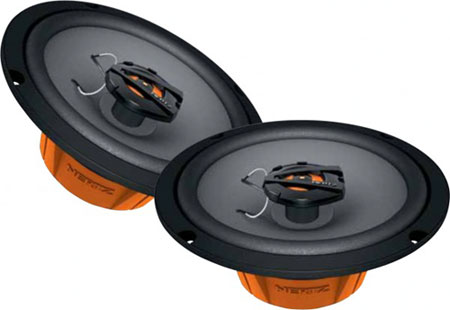Hertz Dieci DCX 165 Two-way Coaxial Loudspeakers
Two-way coaxial loudspeaker intended to be sold as an upgrade for OEM stock speakers with four mounting holes around their edges and a pole mounted tweeter on a single capacitor by way of passive crossover. Their orange Mylar tweeters reach up to 21kHz . Their chassis are pressed steel with a powder coat finish. (quaintly and literally translated to ‘dust paint’ from the Italian) The woofers have a foam top roll surround stuck with heat resistant adhesive (we are told) and the magnets wear an orange plastic boot but are not supplied with any grilles nor fixings or speaker cable like, say a set of Pioneer Accelerate speakers would be. The quick start guide takes a new record for being in 23 languages! They do have quite a large motor structure on their rears for their size and cost.
– Power Handling 60w RMS, 120w peak
– Impedance 4 Ohms (Re 3.2 Ohms, so will be a tad louder than a truer four Ohm speaker)
– Sensitivity 93dB 1w/1M
– Passband 60Hz to 21kHz
– Crossover -6dB (single capacitor) @ 4kHz
– Tweeter diameter 15mm
– Lug terminals not Gold plated on sample
– Mounting Depth 61mm
– Cone: Water repellent pressed paper
– Tweeter: Mylar dome with Neodymium magnet and Ferrofluid cooling/damping
– Chassis: Pressed steel with powder coating
– Complete with: window sticker and screws/screwclips but no grilles
– Quick start guide in 23 languages and warranty card in seven languages new record!
– Mounting template printed (not perforated) onto carton
– Orange Silicon rubber boot on magnet with rear decal
– Flux density: 3.97T-m
– Suspension compliance CMS (mm/N): 0.78
– FS: 66Hz
– QES: 0.62
– QT: 0.58
– QMS: 8.68
– Moving Mass: 7.5g
– VAS: 20.41 litres
– Weight 736 grammes each speaker
Review by Adam Rayner
The first notes that came pealing out from these speakers hit me like a tonne of bricks! To call their presentation ‘forward’ would be like using the same adjective for the personality of the model known as Jordan. The tweeters are hugely efficient and sound like their potent capability is being used right down to their low crossover point. Listening on-axis was a tad uncomfortable, so I listened a little bit off-axis and found it better.
After all, one of the big deals upon release with this affordable OEM-Upgrade-aimed product was that their component versions used the Hertz V cone technology for better off-axis sound. This is where the cones go to a sharp inward-pointing concavity, rather than a convex dome as normal, in order to better spread the sound of the cone in the off-axis directions.
It seems to work, even on these ‘incomplete’ cones with a large central pole piece sticking up to hold the tweeter. The sound was still good and aggressive when I listened again, having repositioned away from the direct radiation of the coaxes. I found that the edges and stringy details were there but lacked the detail and immediacy of either the Pioneer TS-A1702i or the Alpine SXE-1725S which have been tested recently. That said, the vocal clarity was impressive if lacking warmth and under driving �windows down’ conditions, or with the use of huge SPL woofer systems, these inexpensive speakers will really cut through.
I wasn’t as impressed with their low level bass performance as I was by the more costly Alpine SPR-17C or the Rainbow SL 165s also recently tried, but again, think this might be about their needing to be set up with a subwoofer or six of their own breed, since they were released with a fanfare and a ten inch and twelve inch subwoofer in the same powder coated orange finish at the same time.
I cannot help but feel that they are beaten on the value stakes by the Pioneer TS-A1703i product, since this has speaker wires, fixings and snazzy grilles included although does not have a neat plastic boot on the magnet and branding underneath that you install and never see again!
But one thing they can do way better than the Alpines and Pioneers at the same price point of actual sale is to be played loud and take some real watts. I gave them beans via a Genesis Stereo 100 amp fed by a Pioneer DEH-P88RSII headunit and they took a lot more wellie than most I have tried recently and just got louder rather than breaking up. That they would be then a bit painful to listen to for long periods of high volume is obvious but if you are a hoolie looking for one set that will take it and cut through the bass mayhem in your loud ride, then these are an option well worthy of looking at. Just don’t expect too much of that audiophile breathy realism, the guys who sell these have other products for that.
Sound Quality 6.0
Build Quality 8.0
Power Handling 8.0
Efficiency 9.0
Value For Money 7.0
Overall rating 7.6

